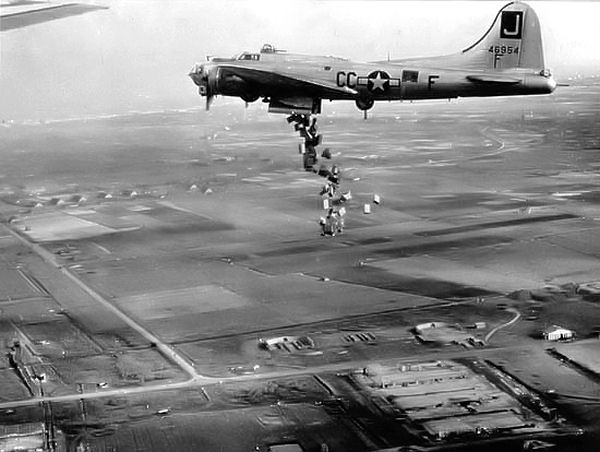Remembering our Greatest Mission

Food being dropped into the Netherlands from a U.S. Eighth Air Force plane in May, 1945. The food drops British and American planes saved millions from starvation.
It
was 70 years ago this spring when the U.S. Air Force undertook what
one pilot called the greatest mission he had ever flown. It was an
operation over the Netherlands near the end of World War II. It was
not bombs they were dropping, but instead it was food.
The
Netherlands was suffering from a famine as a result of Nazi
occupation. Millions of the Dutch people would die unless the Allies
took action.
An urgent message from the Supreme Allied
Headquarters under General Eisenhower stated: “For sheer
humanitarian reasons something must be done at once. The Dutch
government states supplies in occupied Holland will be used up by 28
April. Our information confirms theirs that deaths through famine
will then start on a considerable scale unless supplies are promptly
replenished.”
British and American planes airlifted
food during April/May into the Netherlands, which saved millions of
lives.
Lt.
Alfred E. Isaac, the aforementioned pilot, wrote to his parents in
Cincinnati, "People jammed roads, bridges, dikes and roof tops,
waving table cloths, handkerchiefs, and any old rag they could find,"
as the planes flew overhead dropping the food packages. "It made
a lump in our throats to see the appreciation on the faces of those
people. That is all the credit I want."
Truck
convoys of food entered the Netherlands soon thereafter. Food
stockpiles had been built up for this humanitarian purpose, not
without great difficulty. Food had to be diverted to feed Belgium
during that winter and the Netherlands supply had to be replenished.
It shows the importance of advance preparation for hunger relief.
There are always behind the scenes heroes doing the planning.
It's
important to remember these heroic acts of World War II that saved
people from certain starvation. But today the tragedy of famine
continues.
There are war victims today that are being blocked
from receiving food aid. They are being starved to death as you read
this. We must keep up the fight to bring food and hope to these
suffering people.
At this very moment, civilians in
Syria, Iraq, Yemen, South Sudan and other war zones are struggling
each day to find any kind of food. They depend on the humanitarian
agencies like the UN World Food Programme (WFP), Catholic Relief
Services, Save the Children, UNICEF and others who can bring them
life-saving aid. That is if combatants allow them to pass through
safely.
In Yarmouk refugee camp, which is
near Damascus in Syria, a tragedy is unfolding. The camp is home to
Palestinian refugees caught in the middle of Syria's civil war.
The
civilians of Yarmouk, over the last couple of years, often have been
blocked from receiving humanitarian aid because of the fighting. The
United Nations Relief and Works Agency (UNRWA) was able to bring in
some food and supplies in March. These were the first deliveries in
months.

But then ISIS, the terrorist army, attacked
Yarmouk and they now occupy most of the camp and surrounding area.
The aid convoys cannot get through now. The UNRWA spokesperson, Chris
Gunness, describes “unimaginable suffering to the 18,000
Palestinian and Syrian men, women and children trapped in Yarmouk,
who survive under constant threat of armed violence, and remain
unable to safely access water, food and the most basic
healthcare.”
In South Sudan there are also starving
war victims that relief agencies are trying to reach. WFP and
Catholic Relief even air drop food in remote jungle areas to feed the
hungry in South Sudan.
Humanitarian agencies struggle
daily on finding ways to bring food to those in war zones. They must
negotiate with combatants and hope for a ceasefire to move supplies
in to a besieged area. In some cases negotiation is not even
possible.
The terrorist group ISIS has prevented
children in Syria from receiving a special food called Plumpy'Doz,
which fights malnutrition. Without this food, small children will
suffer lasting physical and mental damage, or death. They need this
food desperately. Yarmouk is one of the areas where Plumpy’Doz
and other food shipments have stopped because of ISIS.
Other
times relief agencies cannot feed the hungry because they lack the
necessary funding. This can lead to a cut in rations or even a
suspension. This has taken place in Syria where WFP needs around US
$25 million a week to feed hungry war victims. They depend on
voluntary donations but sometimes they do not receive enough.
This
is a tragedy that can be avoided, if we have the will. There is more
than enough food on the planet for everyone. Relief missions to feed
the hungry should always have the funding they need.
As
we mark the anniversary of the great World War II mission that saved
the Netherlands, we must keep that spirit alive. They are starving
people today that are days way from death unless food can be
brought to them. We, the international community, need to summon
every ounce of strength and determination to help save them. That is
our mission.